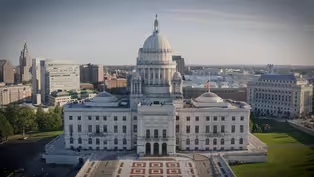
Green Seeker: Toxic Pond
Clip: Season 5 Episode 23 | 11m 15sVideo has Closed Captions
A new state plan aims to reduce pollution in Mashapaug Pond.
Mashapaug Pond, the largest freshwater body in Providence, has long been off-limits for recreational use. Stormwater runoff is largely to blame. A new state plan aims to hold property owners responsible for the contamination that’s seeping into the pond and eventually ending up in Narragansett Bay.
Problems playing video? | Closed Captioning Feedback
Problems playing video? | Closed Captioning Feedback
Rhode Island PBS Weekly is a local public television program presented by Ocean State Media

Green Seeker: Toxic Pond
Clip: Season 5 Episode 23 | 11m 15sVideo has Closed Captions
Mashapaug Pond, the largest freshwater body in Providence, has long been off-limits for recreational use. Stormwater runoff is largely to blame. A new state plan aims to hold property owners responsible for the contamination that’s seeping into the pond and eventually ending up in Narragansett Bay.
Problems playing video? | Closed Captioning Feedback
How to Watch Rhode Island PBS Weekly
Rhode Island PBS Weekly is available to stream on pbs.org and the free PBS App, available on iPhone, Apple TV, Android TV, Android smartphones, Amazon Fire TV, Amazon Fire Tablet, Roku, Samsung Smart TV, and Vizio.
Providing Support for PBS.org
Learn Moreabout PBS online sponsorshipd businesses, homes, and industrial sites sits the largest body of fresh water in Providence, Mashapaug Pond.
Suzannah Rutherford bought a home overlooking the water six years ago.
- It's just so open when you stand here and look out.
I mean, it's beautiful.
It's just like you see more sky, you feel like you have a larger expanse of yard.
- [Michelle] Rutherford fell in love with the scenic views from her gazebo, but she also had her share of questions.
Signs around the water warn Mashapaug Pond is sick.
- I was very concerned, so I did a lot of research before we moved here.
- [Michelle] For nearly 100 years, the Gorham Manufacturing Company, one of the largest producers of Sterling Silver, operated a factory by the pond and dumped toxic byproducts into the water.
- Gorham Silver was in the cove at the other end of the pond and dumped a lot of solvents in the water.
So I read about the remediation efforts.
I spoke to a few environmental scientists at Brown University.
- [Michelle] Those remediation efforts included dredging the pond's cove in 2015.
These days, pollution left behind from Gorham is not the primary source of contamination in Mashapaug Pond, it's storm water runoff, which can produce a blue green algae, known as cyanobacteria.
- It's an environmental problem of our time that I feel like people are going to be very motivated to figure out how to deal with it eventually.
- [Michelle] Topher Hamblett is one of them.
He's the executive director of the conservation organization, Save the Bay.
- No matter who you are or where you live, you have a right to clean water, period.
And I think it's a travesty that people who live around this pond can't enjoy it as people can enjoy other waters around Rhode Island.
- [Michelle] Storm water runoff, Hamblett says, is causing excess nutrients, like phosphorus, to enter Mashapaug Pond, and it's susceptible to polluted runoff because it's surrounded by impervious surfaces, like asphalt and concrete.
- This whole watershed's a mix of some park areas like we're sitting in now, but also some very wide open, heavily paved areas.
The water, when water hits pavement, it can't go into the ground.
It has to go somewhere, and that's one of the reasons why we see ponds like this so polluted.
- [Michelle] Since at least 1998, Mashapaug Pond has been listed on Rhode Island's list of impaired waters because of the contamination.
- No one likes to see a pond that's covered in green scum or other types of invasive flora that just cover the whole surface of the pond.
A lot of it is, I believe, is getting driven by climate change as well.
- [Michelle] Terry Gray is the director of the Rhode Island Department of Environmental Management, or DEM.
He says warmer waters and more frequent intense storms are adding to the problem.
- When we see these unbelievable short bursts of rainfall, that creates a huge slug of stormwater that's being introduced into our water bodies, and those slugs can really trigger bacterial growth and algae growth.
- [Michelle] Awareness about algae growth has increased in the community.
It's an important message for Loren Spears, a Narragansett Tribal Citizen.
- Water, as the slogan goes, is life.
We need it.
It's a giving force.
- [Michelle] The banks of the pond were once home to a thriving Narraganset settlement.
- Our ancestors have lived here, but also our contemporary ancestors, if you will, just a generation ago, were living on and around this pond.
- [Michelle] Spears credits a decade of annual processions held around the pond with helping to raise awareness about the contamination.
- The average person knew a lot about what was happening here, and it kind of rises to the political entities that can do something about it and puts more pressure on them to do something about it.
- [Michelle] Environmental groups and state agencies have taken note.
In 2018, the Conservation Law Foundation, or CLF, petitioned DEM to require businesses to control stormwater runoff.
But that petition went unanswered.
Then earlier this year, the Rhode Island Attorney General's office got involved.
- We filed our own petition.
We got involved because we've seen the algae blooms in some of our most critical urban ponds.
You can see in the summertime, it's this really bright lime green stuff, algae, on top of these ponds.
- [Michelle] DEM recently announced about 70 businesses near Mashapaug Pond Watershed in Providence and Cranston will be required to control runoff.
The agency's director, Terry Gray, says, in the short term, commercial and industrial properties will have to take basic housekeeping steps, like picking up leaf litter and clearing storm drains.
- A lot of times what happens is the rain flushes nitrogen and phosphorus out of that material by flowing through it, and then the water, which could look perfectly clear, carries those materials downstream and boom.
What that is, is that's food for the organisms that are living in the pond naturally.
And if you over feed 'em, boom, you get this bloom that people see towards the end of the summer every year.
- I have heard from a few people who say, "Look, telling people to clean up their leaf litter or sweep their parking lots doesn't go far enough.
We're asking people for the bare minimum."
- That's where we have to start.
One of the things we may ask some of the property owners to do is to put measures in place to keep that stormwater on your site.
That could include pervious pavement, rain gardens, tree wells.
These are all sort of technologies that are more current that get the water back in the ground, and then it's not flowing over the surface of the land as stormwater.
- Oh my gosh, it's so deep.
- [Michelle] Suzannah Rutherford will be among the first to know if the water quality is improving on Mashapaug Pond.
She's also a volunteer with the University of Rhode Island's Watershed Watch program, which measures water quality.
On this day, Rutherford and a neighbor were out collecting samples.
- We monitor visibility, which is an indicator of how many bacteria or algae are blooming.
We test for chlorophyll content.
We test for dissolved oxygen.
So one of the problems when you have overgrowth from runoff from fertilizer and stuff, that the oxygen lower down, it goes down to the point where fish can't survive.
- Some animals still make their home here, like this swan we saw gliding across the water.
We also spotted a turtle perched on a log.
Topher Hamblett from Save the Bay says cleaning this pond is an environmental justice issue.
Ultimately, what does justice look like in terms of restoring the pond?
- I think justice looks like a clean, vibrant, healthy pond that people in this community are enjoying.
- [Michelle] Hamblett says there's an acceptance of this kind of pollution in urban areas that would not exist in more affluent communities.
- If this pond was in East Greenwich or Barrington, you might see a different response to the pollution that's in it.
- [Michelle] Terry Gray says the work being done in the Mashapaug Pond Watershed, which flows into Narragansett Bay, is a case study with lasting ripple effects.
- As we learn and we see the benefits and we see how to do this effectively, my hope is that we'll apply those lessons to other parts of the state.
- The long-term goal, he says, is to restore the water so it can be fishable and swimmable.
When can people expect to go swimming in that pond?
To go fishing there?
- Too early to say.
Remember, it's taken over 100 years to really get to this point, and that's 100 years of history that we have to overcome in order to restore the water quality in this pond.
So it's gonna take a while.
- [Michelle] Suzannah Rutherford says being out on the water feels like a ghost town.
She's seen rotting docks submerged, a sign, she says, this was once a vibrant place.
- I'd love to be able to dive off a dock and swim across the pond (laughs) someday.
We enjoy just looking at it.
We enjoy the birds.
We enjoy watching the eagles catching fish, but it would be a beautiful thing to have people be able to swim here again.
- [Michelle] But it's unclear how long it will take to make that a reality.
- 100 years from now, I'd like the people to be telling the story about how this generation did this work and repaired this waterway so that others could enjoy it.
You know, there was a time where most people couldn't enjoy the bay, and we did a lot of work, and now most of the bay is enjoyable, and so if we can do that, then we can do this.
- Mashapaug Pond sits right behind our television studio,
Video has Closed Captions
Clip: S5 Ep23 | 10m 25s | Michelle San Miguel talks with researchers studying noise pollution. (10m 25s)
Video has Closed Captions
Clip: S5 Ep23 | 3m 44s | Ted Nesi looks into what’s included in Rhode Island’s new state budget bill. (3m 44s)
Providing Support for PBS.org
Learn Moreabout PBS online sponsorship
- News and Public Affairs

Top journalists deliver compelling original analysis of the hour's headlines.

- News and Public Affairs

FRONTLINE is investigative journalism that questions, explains and changes our world.












Support for PBS provided by:
Rhode Island PBS Weekly is a local public television program presented by Ocean State Media

